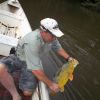
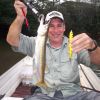
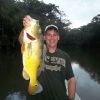
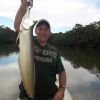
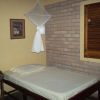
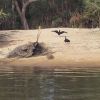
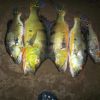
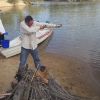
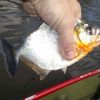
What are my choices for expeditions?
8 Day Sunumi Creek ($3,500 USD)
15 Day Bat Creek ($4,500 USD)
8 Day Rewa River Fishing Excursion ($3,500 USD)
15 Day Rewa River Fishing Excursion ($4,500 USD)
Where do your expeditions go?
We take you into the Rupununi District of Guyana’s wilderness. The drive through Guyana’s Rainforest from Georgetown to Letham is an adventure in itself! You will forever remember traveling through the rainforest canopy and streams while viewing wildlife along the way. Read more about the region here!
What are my choices in terms of expeditions?
We currently offer a 8-day Simuni Lakes Expedition as well as a 15-day Bat Creek Fishing Expedition. Click here to read more about each of these unique experiences.
Who will accompany me on my expedition?
Guyana Eco Fishing and Adventure Tours is led by Captain Larry D. Jones, who is married to a Guyanese woman and has been traveling to Guyana for fishing expeditions for 35 years, and Guide Jules Fredericks. Read more about us here!
How much do the expeditions cost?
Expeditions are $3500/per person for the 8 Day Trip and $4500/per person for the 15 Day Trip. A $500 deposit is required with booking. The deposit is fully refundable except for any airline tickets purchased with 30 days notice. Final payment is due 30 days before departure for Guyana. Payment in full can be made anytime after setting trip dates and is refundable with the exception of any airline tickets purchased up to 30 days before departure. Please note that all prices are given in US Dollars. Click here to book your trip reservation today.
What is included in the cost of my expedition?
Guyana Fishing and Eco Adventures provides Airfare from Ogle Airport to Lethem; interior travel; all meals; beverages; the expertise of our captains, guides, and staff; equipment for boating, fishing, and camping (i.e. tarps, hammocks, etc.); and a first aid kit.
What type of weather should I expect?
The dry heat index is 85 degrees (F) during the day and at night it will fall to the low 60s (F) so you will need a sleeping bag liner to sleep in. Rainfall usually occurs in the late afternoon in Georgetown but is short in duration. In the Bat Creek area rain only falls occasionally from January through April, as the weather is mostly always sunny to slightly overcast. The air is very eco clean and on clear nights you will see a sky full of stars like you have never seen in your lifetime.
How will camp be set up during my expedition?
Camp is set up on high dry sandy ground with a very large tarp canopy. Poles are positioned in the ground for hanging hammocks with insect netting, however if you prefer, two person tents can be used instead. A generator with lights is set up, as well as a kitchen, portable shower/bathroom enclosure, and wash basin with water tap and mirror.
What are the accommodations concerning meals?
Breakfast, lunch, and dinner will be cooked each day. For those who want to fish through lunch, MRE’s (meals ready to eat with a military heat pack) will be offered to eat in the boat. Bottled water, juice, coffee, pop, and rum will be supplied.
What wildlife will I see during my expedition?
During your expedition you could see wildlife including freshwater otters, black camen, harp eagles, storks, laba, red howler monkeys, spider monkeys, capuchins, mannekins, macaws, toucans, parrots, hawks, tannegers, trogans, puff birds, and more!
Am I guaranteed to catch fish and/or see wildlife?
Our packages take you to places in which we have had fantastic experiences seeing wildlife and catching fish. Unfortunately since the behavior of wildlife is not within our control, we cannot guarantee what/how many animals you will see or fish you will catch. Fortunately, this also means that every expedition is different and each visitor leaves with his/her own unique memories.
Will insects be a problem?
Insects are not typically a problem during the dry season. As a precaution, we provide mosquito nets for use while sleeping and we encourage you to bring insect repellent (make sure yours contains deet) and antihistamines.
How can I be sure my visit will not negatively impact the Guyana ecosystem?
We take many measures to ensure that our expeditions do not harm areas we visit. For example, to preserve this area everything carried in is carried out and no permanent structures are built.
What should I bring?
While you’ll want to keep your luggage light due to the fact that it will need to be carried, here are some items we suggest you bring based on our experience: toiletries, towel, sunglasses, sunblock, a hat, long sleeved shirt, long pants, good walking boots, binoculars, camera, insect repellent (containing deet), antihistamines, a sleeping bag liner to keep warm at night, rain coat, an umbrella for the rain and use as shade, torchlight with extra batteries (or even better, a headlamp), a pocket knife, fishing equipment, and first aid kit.
What is the policy on tipping?
Tips are accepted and appreciated as a way of showing your satisfaction and appreciation.